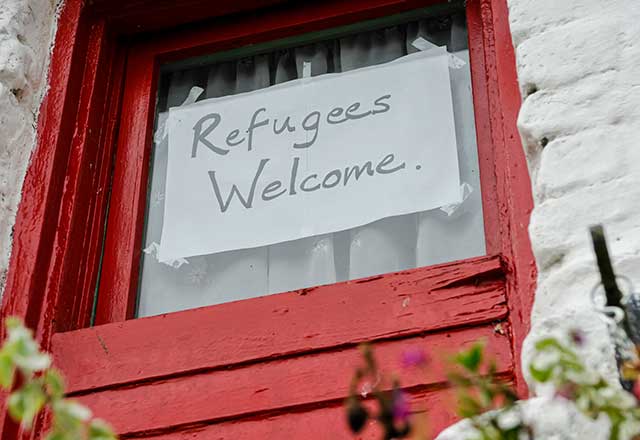In mid-August, the Taliban took control of the Afghan capital of Kabul. In the aftermath, hundreds of thousands of Afghans were airlifted out of the Kabul airport to be resettled to neighboring countries. Thousands of refugees have already made their way to the United States, and a large portion of them have been relocated to the D.C.-Maryland-Virginia area. Several families are now settled here in Baltimore. Having fled unrest, uncertainty and violence, most refugees arrive in a new country with next to nothing of their own, and several local Baltimore organizations have rallied to help Afghan families rebuild their lives.
Learning How to Help
During Healthcare Disparities, my very first course as a medical student at Johns Hopkins, students had the chance to speak with Mr. David Duwante of the International Rescue Committee (IRC), who explained the important role of the IRC in responding to the world’s humanitarian crises: resettling refugees into new homes, helping them get documentation and find job opportunities, providing youth education and English language instruction, and offering health services.
Organizations like Baltimore’s International Rescue Committee have supported refugee populations for years, and have been an especially important resource during the COVID-19 pandemic. According to the IRC, 40% of Baltimore’s refugee working adults have been laid off since March 2020. Among the most daunting problems for struggling refugee families during the COVID-19 crisis were food insecurity, lack of sustainable income, and increased isolation due to limited technology. The IRC met these challenges by connecting families to food pantries, providing grocery deliveries, helping with tax filing, and gifting laptops to students.
Additionally, Lutheran Immigration Refugee Service (LIRS), another local refugee agency, provides food, clothing, housing and other resources to refugees in Baltimore, and recently spearheaded a donation drive to help support resettled Afghan refugees.
Supporting Communities in Baltimore
A key personal takeaway from Healthcare Disparities was learning how I might serve the needs of diverse and vulnerable patient populations. In recent years, the topic of immigrant and refugee health has become more central to medical school curriculums. Since over half a million immigrants enter the United States each year, this shift is welcome and necessary.
Locally, over one hundred thousand immigrants call Baltimore home, and several thousand refugees have been resettled to Baltimore in the last five years. For health care providers, understanding a patient’s background, native language and social history is of utmost importance in attending to their health needs. Speaking directly to patients and local organizations provides a path toward greater cultural humility — an emerging concept in medicine that involves a willingness to recognize and question our own cultural biases to redress power imbalances in the physician-patient relationship, and develop mutually beneficial relationships with the communities we serve.
Above all, Baltimore shines through as a hub for embracing refugees and advocating for them as our friends and neighbors, and local refugee service organizations make it incredibly easy and worthwhile to get involved.
Looking to support refugees worldwide and locally in Baltimore?
You can donate to support displaced people in Afghanistan and worldwide here or help support the IRC in Baltimore directly here.
You can learn more about volunteering to welcome our Afghan neighbors in Baltimore with LIRS here.
[themify_hr]
Related Content
- Addressing Health Care Disparities in the Hispanic Community
- Ways in Which We Can Help Throughout the Coronavirus Pandemic
- International Students Face an Extra Hurdle during COVID-19
- Coping With Pandemic Fatigue
Want to read more from the Johns Hopkins School of Medicine? Subscribe to the Biomedical Odyssey blog and receive new posts directly in your inbox.

This article is very informative and I am glad to see that there are organizations out there dedicated to help refugees.
Hello, thanks for this topic! Understanding a patient's background, native language, and social history is critical for health care practitioners to cater to their health requirements. Speaking directly to patients and local organizations is a step toward greater cultural humility, an emerging concept in medicine that entails a willingness to acknowledge and question one's own cultural biases in order to address power imbalances in the physician-patient relationship and build mutually beneficial relationships with the communities we serve.
Comments are closed.